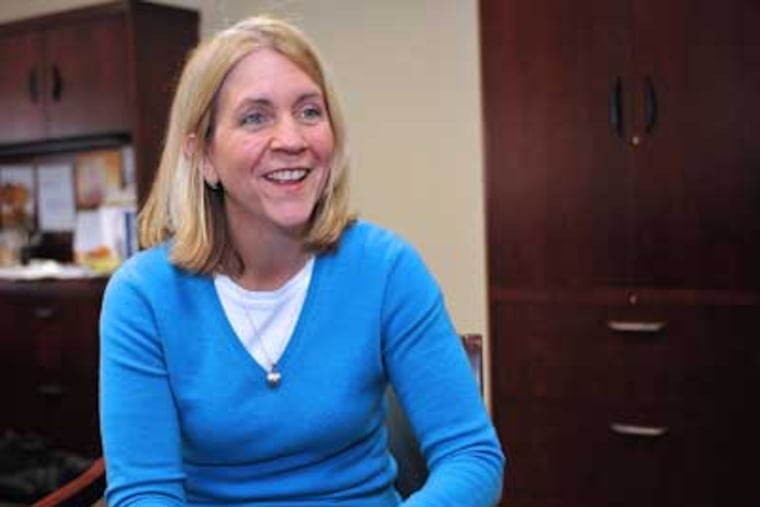
Patricia Hasson heads an organization whose fortunes are rising as the economy falters: the Consumer Credit Counseling Service of Delaware Valley.
The nonprofit organization has been adding staff and offices to deal with the flood of homeowners having trouble keeping up with mortgage payments.
Hasson, who left CoreStates Bank in 1998 to join the credit-counseling service, said she wondered what her new counselors would do after the mortgage crisis ends, which she is certain will happen.
Over the long term, she expects the group, with a budget this year of slightly more than $5 million and 68 employees, to offer more first-time home buyer programs and perhaps even help people deal with student loans and reverse mortgages.
Question: This organization has been on a rapid-growth trajectory. How much has it grown and how are you managing it?
Answer: We have grown tremendously. . . . We're now at 35 full-time counselors. At the end of '06, we were at 12, to give you an idea. . . . We have seen just that the demand has risen. We now have 13 offices. We're getting ready to open our 14th office April 1. . . .
Q: What about the growth in the number of counseling sessions?
A: We ended the year at 17,400 sessions. The year prior we were just under 12,000.
Q: Some of your funding comes from industry grants. How do you negotiate that, considering that you have to be critical sometimes?
A: It is a challenge. I serve on the Consumer Advisory Council, and I often give this story where I was going head to head with a banker, arguing about the changes that are happening now in the credit card world. . . . And at the end of the meeting, he came up to me and said, "And by the way, you were asking about that funding opportunity."
I believe bankers get that my role is to protect consumers, and they recognize that I'm going to fight for consumers. And as long as I'm fighting for consumers . . . without particularly attacking their practices, I focus more on what I'm trying to do to help consumers and how perhaps some of their practices may impede even their own progress over time.
Q: Do you ever see things in those meetings, or in working with industry groups, that just appall you?
A: No. I think the great part of being on the Consumer Advisory Council is there's lots of viewpoints. I don't always agree with their viewpoints, but I can at least understand and appreciate they have a different viewpoint. . . . If you know that profit is their bottom line, they're acting based on that, right? Which is not always in a consumer's best interest. . . . I think the other key is it's not personal. I mean, I was a former banker.
Q: Do you think the Philadelphia foreclosure-prevention program will have a long-term impact?
A: From what I understand, and from talking to counselors and anecdotally, most of what we're seeing is short-term fixes. They are not long-term adjusting the mortgage rate for the next 15 years. It's tacking things on to the end. It's adjusting interest temporarily for two years. . . . We're not hearing overwhelmingly that people are modifying these mortgages to keep people in their homes over the next 15 to 30 years.
Q: How would you fix the nation's mortgage-foreclosure problem?
A: I think I've said this to anybody who will ever listen, that the way we're doing these workouts is just plain wrong. It's a one-off.
It's depending on servicer by servicer and individual by individual at the servicers. . . . There's a lot more work that we could all be doing much more efficiently as housing counselors and servicers, if there was a better system in place. One, electronically. A lot of this is still over the phone and mailing packages.
A lot of the programs that you see coming out from the federal government are very complicated. For the average consumer, it's almost a disincentive to even want to do it. . . . I don't think they've solved the basic housing problem in stabilizing housing prices. Until we do that, we're still going to continue to have these losses. If we're doing the short-term fixes and two years from now we still haven't fixed the housing market, these individuals are going to be back in to see us.
We could keep our counselors employed, when you think about it, through default and delinquency, because we're not really solving the underlying problem.
Patricia Hasson
Age: 46.
Birthplace: Havertown.
Occupation: President of Consumer Credit Counseling Service of Delaware Valley.
Education: Bachelor's degree in finance from the University of Dayton and M.B.A. from Villanova University.
Personal: Husband, Patrick, and four children.
Hobby: Traveling.EndText